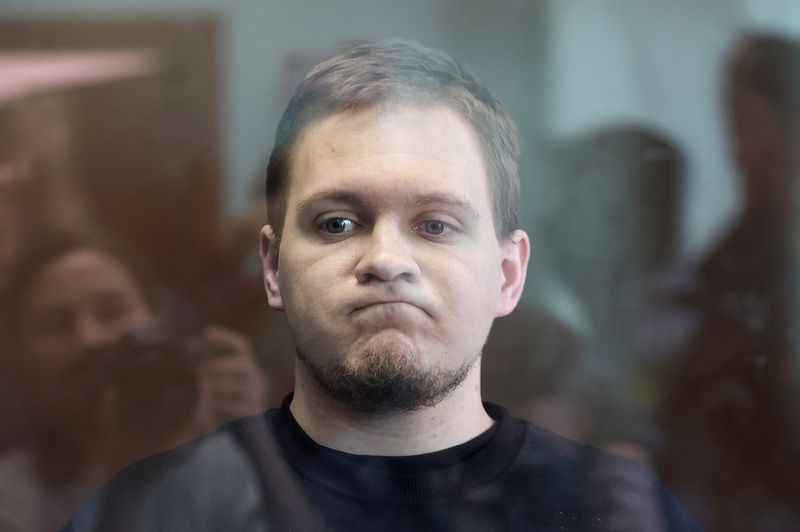By Andrew Osborn
LONDON (Reuters) -A Russian opposition activist who used social media to condemn Moscow's war in Ukraine received an eight-and-a-half year jail sentence on Tuesday after a Moscow court found him guilty of spreading false information about the army.
Dmitry Ivanov, who ran a protest channel on the Telegram social network for students of Moscow State University, said his statements about what Moscow calls its "special military operation" in Ukraine were accurate and denied any wrongdoing.
Speaking in English from a glass box inside the courtroom before the verdict, he called the conflict a tragedy for Ukrainians and Russians.
"You must understand that Russia is not (President Vladimir) Putin and we did not authorise and he did not ask us about starting this war with our close neighbour," said Ivanov, in video footage carried by the Sota Telegram channel.
The verdict, published by his lawyer Maria Eismont on Facebook (NASDAQ:META), said Ivanov would serve out his sentence in a penal colony. He was also banned for four years from being an administrator for Internet or social media sites.
The Kremlin says the majority of Russians support its actions in Ukraine and opinion polls back that assertion.
Hundreds of thousands who disagree with the decision or fear conscription have fled the country, however, and those who remain, risk being jailed if deemed to have discredited the army, which means that people are careful about what they say.
Ivanov said he believed "tens of millions" of people inside Russia opposed the war like him and that many had friends and relatives in Ukraine whose pain they felt.
'DARK MOMENT IN HISTORY'
Elena Stromskaya, his mother, told reporters she believed her son was being unfairly persecuted.
"A person should not go to jail for his beliefs. This sentence will certainly be overturned. Sooner or later it will be overturned," she predicted.
Shortly after sending tens of thousands of troops into Ukraine just over a year ago, Russia introduced sweeping wartime censorship laws which have since been used to silence dissenting voices across society.
"Discrediting" the army can currently be punished by up to five years in prison, while spreading deliberately false information about it can attract a 15-year jail sentence.
Russia's parliament this month gave its initial backing to a law that would bring in longer prison sentences and extend the legislation to cover the Wagner mercenary force.
Ivanov was accused of writing or reposting on Telegram a series of claims about the Russian army's behaviour in Ukraine, including allegations of war crimes.
Russia, which says it is fighting an existential war against Ukraine and an aggressive West in order to protect its own national security, denies that its forces have committed war crimes and says they do not deliberately target civilians.
Kyiv and its Western allies accuse Moscow of waging an unprovoked war of aggression to grab territory in Ukraine.

Ivanov said he wanted peace.
"Today is a dark moment of our history," he said. "But the darkest moment is always the first sunrise."
